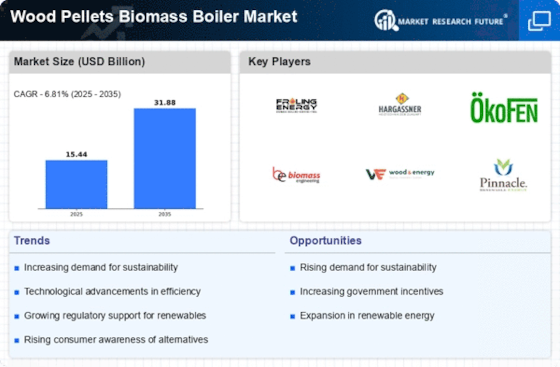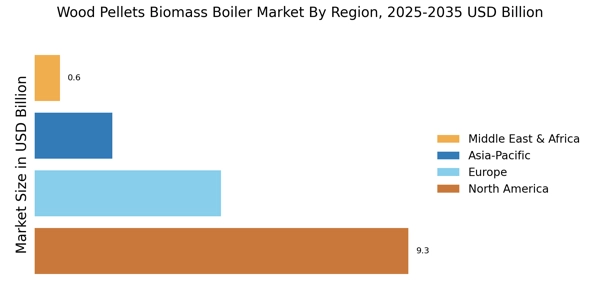Increasing Energy Demand
The Wood Pellets Biomass Boiler Market is experiencing a surge in demand for energy due to rising population and industrial activities. As economies expand, the need for sustainable energy sources becomes more pressing. Biomass boilers, particularly those utilizing wood pellets, offer a renewable alternative to fossil fuels. According to recent data, the energy consumption in various sectors is projected to grow by approximately 2.5% annually. This trend indicates a potential increase in the adoption of wood pellets as a primary energy source, thereby driving the market forward. Furthermore, the shift towards decentralized energy production aligns with the capabilities of biomass boilers, which can be installed in residential and commercial settings, enhancing their appeal in the energy landscape.
Government Incentives and Subsidies
The Wood Pellets Biomass Boiler Market is significantly influenced by government incentives and subsidies aimed at promoting renewable energy sources. Many governments have implemented policies that encourage the adoption of biomass technologies through financial support, tax credits, and grants. These initiatives are designed to reduce the initial investment costs associated with biomass boilers, making them more accessible to a broader audience. For instance, certain regions have reported a 30% increase in installations due to favorable government policies. Such support not only enhances the market's growth potential but also aligns with global sustainability goals, encouraging a transition towards cleaner energy solutions.
Growing Awareness of Climate Change
The Wood Pellets Biomass Boiler Market is increasingly driven by the growing awareness of climate change and the need for sustainable energy solutions. As public consciousness regarding environmental issues rises, more individuals and businesses are seeking ways to reduce their carbon footprint. Biomass energy, particularly from wood pellets, is recognized as a carbon-neutral option, which resonates with eco-conscious consumers. Studies suggest that the adoption of biomass heating systems can lead to a significant reduction in greenhouse gas emissions compared to traditional fossil fuels. This shift in consumer behavior is likely to propel the market forward as more stakeholders prioritize sustainability in their energy choices.
Cost-Effectiveness of Biomass Solutions
The Wood Pellets Biomass Boiler Market benefits from the cost-effectiveness associated with biomass energy solutions. As traditional energy prices fluctuate, biomass presents a stable and often lower-cost alternative. The production of wood pellets has become increasingly efficient, leading to reduced costs for consumers. Reports indicate that the price of wood pellets has remained competitive compared to natural gas and heating oil, making biomass boilers an attractive option for heating and energy generation. Additionally, the long-term savings on energy bills can be substantial, further incentivizing consumers to invest in biomass technology. This economic advantage is likely to bolster the market as more individuals and businesses seek to minimize their energy expenditures.
Technological Innovations in Biomass Boilers
The Wood Pellets Biomass Boiler Market is witnessing rapid technological advancements that enhance the efficiency and performance of biomass boilers. Innovations such as improved combustion technologies and automated feeding systems are making these systems more user-friendly and efficient. Recent developments indicate that modern biomass boilers can achieve efficiencies exceeding 90%, which significantly reduces fuel consumption and emissions. This technological evolution is likely to attract more consumers who are seeking reliable and efficient heating solutions. Moreover, the integration of smart technologies allows for better monitoring and control, further appealing to environmentally conscious users who prioritize sustainability in their energy choices.

















